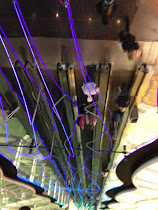What it's REALLY like to live with a Special Educational Need
So, I've been wanting to write this one for a while,
but have been unsure how to write it, as I will have lots of
ex-colleagues who may well be reading this.
I'm going to try and be 'positively' realistic - if that's actually a phrase!
Dyspraxia is one of those that some of you may know a little about,
but might confuse it with dyslexia.
For those of you that have't heard of dyspraxia at all,
the best way to describe it (without using any dictionary definitions)
is as a struggle with co-ordination, spacial awareness,
and a different way of thinking- how we process the information around us, and given to us.
While I was still working as a Learning Support Assistant,
my colleagues put on a video in an assembly about autism.
The narrator asked, 'Is the wold too bright, too loud and too fast?'
This made me really stop and think about who I am,
and how my dyspraxia affects me.
My answer to this question is-
YES. The world IS too bright, too loud and too fast.
But what's the difference between dyspraxia and autism?
They're nearly always put under the same bracket.
Over the last few years, when I've been filling in application forms, and I have to tick the box to claim my disabilities, I now always tick dyspraxia,
and autism is pretty much in the same category.
I often feel upset about this.
I haven't ever considered myself autistic in any way.
But we know for sure that I'm dyspraxic, and I will say this-
Living with dyspraxia is HARD.
There are many amazing things that come with it. though.
Creativity, problem-solving (I've spent my life problem-solving!)
and having the drive and ambition to strive for the life that everybody else achieves.
However.
I definitely have days where my confidence and self-esteem are pretty low,
because of the fact that I really struggle with some of the basic,
every day things all my friends can do.
-tying shoe laces
-cooking (chopping, peeling, timing multiple things on the hob)
-directions (finding my way around, and giving them!)
-buttons
-driving
-maths
-sports/ physical games,
especially those that involve throwing and catching a ball!
These are just a small number of tasks that a child or adult with dyspraxia might show signs of.
So how have I survived to the age of nearly 28?
As I've grown up, I've found many ways of micro-managing the
tasks I struggle with on a daily basis.
You might see it as a sign of avoidance, but for me,
it makes my life a lot easier. For example;
-avoiding buying shoes with laces
-using google maps, and ask, ask, ask for directions,
even if it takes ten different people by the time I arrive
-writing down instructions, asking for written instructions,
or asking questions while I carry out a task.
-finding some time in the day for myself,
where my mind can shut down for a while to absorb all the information
and events that have taken place.
Dyspraxia is different for everyone who has it.
We all show different 'signs' and have very different experiences;
some might be able to cook well- I certainly can't.
Some might even be able to play a few sports-
I was definitely never the sporty one at school.
If I appear to be very quiet in a social situation,
I'm not being anti-social- there's probably just too many conversations
happening around me for my brain to absorb, making me feel anxious-
as I often don't know when to join in.
I once had an LSA (my own LSA!) tell my mum that
I should be going to a special ed secondary school.
If you're dyspraxic, dyslexic, or autistic, and you're reading this, I want to say now, don't let anyone tell you that you can't, because YOU CAN.
Since my LSA telling my mum that I should have gone to a special ed secondary, I have;
-Graduated with a BA (with Honors)
-worked as an LSA myself for two years
-travelled a lot of the world (Camp America,
and taught English in Slovenia, Thailand and Vietnam)
-directed the lovely HATS drama group in three shows
-Recently been offered an MA at Mountview drama school in London.
Don't get me wrong. The life that I have achieved has taken
so much energy, brain work, and absorbing maybe
too much information at times that I have had to take an
introverted breather. I've even recently started yoga
to try and change my thought patterns (and mostly to cope with my ongoing vertigo.)
I also understand that I've been very lucky to have had this life,
and not everyone knows or understands how to find strategies to cope.
I've also had a very supportive family and supportive colleagues throughout my 20's.
It might seem now that I'm showing off, But I'm not (I hope!)
I wanted to write this, particularly for those who have a specific
learning difficulty (as they are now abbreviated)
that you CAN do it, no matter what the world tells you.
Don't let your 'needs' define who you are.
They're what make us different- but also interesting, and definitely- human.
If you're completely knew to dyspraxia- read up on it.
Support the people you know that might have it.
If you do know somebody with it,
make sure you break down information for them-
nothing worse than an over-load of information!
Most importantly- we need to show the world that these needs are not a 'disability'
or a hindrance- we can do what everyone else does, just in a slightly different way.
The world would be boring if we were all the same! x
















Fantastic 👍🏼💕
ReplyDelete